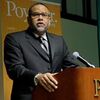As US President Donald Trump was arranging a trade truce with President Xi Jinping of China in Buenos Aires over dinner on Saturday night, his administration was coordinating the arrest of a top Chinese technology executive who was flying through Canada. The arrest of Meng Wanzhou, the chief financial officer of Huawei and daughter of its billionaire founder, is a serious if not gangster move by the Trump administration. What does this mean, and how does it bode for the future? The NY Times writes, "The detention is a boon to administration officials trying to limit the global spread of Chinese technology, especially equipment that poses security risks, and to enforce sanctions with Iran. But the move threatens to upend sensitive talks to resolve a trade war between the world's two largest economies." The Asia Times writes, "The fallout from the decision has rocked mainland markets and threatened the trade war truce between Washington and Beijing." What's going on here?
US lawmakers have brought General Motors CEO Mary Barra to Capitol Hill for a series of private meetings this week as the company comes under fire after announcing up to 14,000 job cuts. Barra isn't publicly testifying this week. She's meeting behind closed doors with several lawmakers representing regions that will be hit hard by the cuts. What's really behind these discussions? Meanwhile, trade conflicts have cost Nebraska's economy more than $1 billion. The Nebraska Farm Bureau says the state's farmers have lost upward of a billion dollars in revenue from ongoing trade conflicts, according to a new report. Are these losses limited to the agriculture sector in the Midwestern US, or is this the tip of the iceberg? Are we looking at farmers losing farms if this trade war continues? It's one thing to retool a factory. For example, with GM talking about closing plants in Ohio and Michigan and the discussion with Barra, you can re-tool and retrain plant workers, but what do you do with displaced farmers across the Midwest of the US?
As a result of the midterm elections, some more progressive voices are on their way to Congress. Congresswoman-elect Alexandria Ocasio-Cortez joined 150 youth activists in a sit-in recently at House Minority Leader Nancy Pelosi's Capitol Hill office, where the group called for congressional action on climate change. What's behind this effort, and will climate change become a rallying cry or galvanizing force across politically active groups?
There's a piece in The Atlantic entitled, "The Democratic Party Wants to Make Climate Policy Exciting: After years of infighting, the Democrats may finally have found an environmental consensus in the Green New Deal." Speaking at a town hall led by Senator Bernie Sanders, Representative-elect Alexandria Ocasio-Cortez framed her chosen climate policy-the Green New Deal-through the lens of gallant American exceptionalism. "This is going to be the New Deal, the Great Society, the moon shot, the Civil Rights movement of our generation," she said. What is the Green New Deal?
GUESTS:
Dr. Gerald Horne — Professor of history at the University of Houston and author of many books, including Blows Against the Empire: US Imperialism in Crisis.
Dr. Jack Rasmus — Professor of economics at Saint Mary's College of California and author of Central Bankers at the End of Their Ropes: Monetary Policy and the Coming Depression, who also writes at jackrasmus.com.
Gloria Mattera — Co-chair of Green Party USA. She has been a member of the Green Party since 2001. Coming to the Green Party through the Ralph Nader campaign, Gloria has been involved in building a left, political independent movement since the mid '90s as a leader in the Labor Party New York Metro Chapter.
We'd love to get your feedback at radio@sputniknews.com



